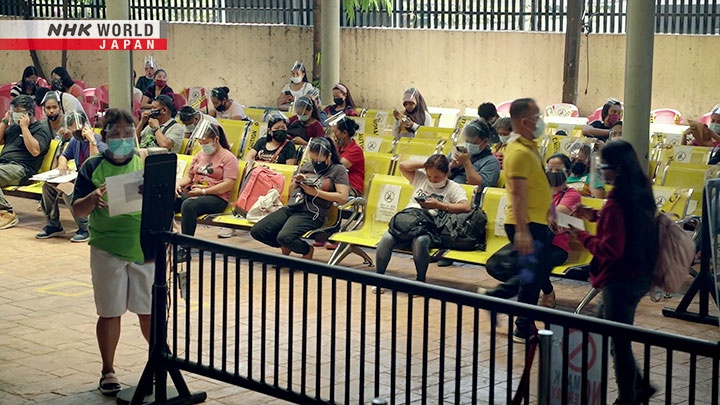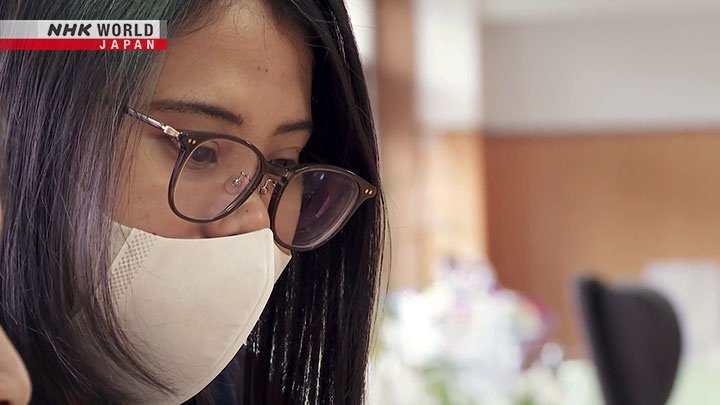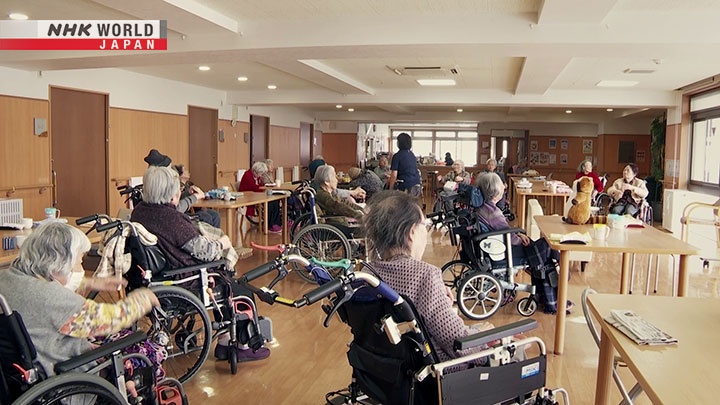I Dream of Caring
This episode is a co-production between the Philippines and Japan. It depicts the daily struggles of a Filipina woman working in an eldercare home and other women from the Philippines who are studying Japanese with the hope of finding work in Japan.



Transcript
Around 900,000 people from Southeast Asia are studying or working in Japan.
Nearly 70% of them are under 35 years old.
All of them have dreams and face a variety of struggles.
The Japan Foundation undertook a project, to chronicle the lives of these people and the families and friends who are supporting them back home.
It's called DocCross Asia.
It aims to foster collaboration between Japanese broadcasters and Southeast Asian filmmakers to create documentaries under the theme of "Multiculturalism in Japan."
This film focuses on women from the Philippines working as caregivers.
Japan doesn't have enough people to care for its aging population, so the government has developed a framework to recruit workers from elsewhere in Asia.
I worked as a nurse in the Philippines.
So I thought I could be a caregiver in Japan.
The Filipino director is Kristoffer Brugada of Brigade Productions, an up-and-coming filmmaker who makes documentaries about education and welfare.
The Japanese participant is Church Atsuko of Goolight, a cable TV station in Nagano Prefecture.
With close ties to the local community, she has been active in covering issues related to eldercare.
Since production took place during the COVID-19 pandemic, the production teams never met in person.
Instead, they engaged in online meetings and previews, each time discovering new perspectives.
At the center of this story are two women: Lovely, who works as a caregiver in Japan.
And Mayee, who dreams of one day following in Lovely's her footsteps.
I want to be a caregiver in Japan and give my children a better future.
Japan is much safer than my country,
and life here is ten times better.
The salary for caregivers is ten times higher.
Japan has an aging population problem.
29 percent of its people are over 65.
By 2040, the ratio is expected to rise to 35%, and 690,000 more caregivers will be needed to support the elderly.
To address this problem, Japan created several ways to allow foreign care givers to work in the country.
One is based on a free trade agreement with three Southeast Asian countries covering nurses and caregivers from the Philippines, Vietnam, and Indonesia.
The Philippines has sent more than 2,500 care workers to Japan since the agreement took effect in 2009.
Another is the status of residence for nursing care.
Since 2017, Japan has allowed foreign students to become caregivers.
Given the poor working conditions and low salaries back home, many Filipino care workers now consider Japan an attractive destination for employment.
This is their story.
This time of day is calmer and less busy.
Lovely came to Japan in 2016 as a nursing care student.
I worked as a nurse in the Philippines, and
nursing work and caregiving are similar.
So I thought I could be a caregiver in Japan.
After two years studying Japanese, Lovely entered a vocational school
and started working part-time as a caregiver.
My salary as a part-timer was lower.
I was working and studying at the same time,
so I was always tired.
Four years after coming to Japan, Lovely passed the national board exams with flying honors.
Hello. Here is your apron.
Thank you very much.
When I first came to Japan,
I could not speak Japanese very well.
After studying the language for two years,
I gradually became more fluent.
Learning the language is really difficult, but Japanese medical terminology is way harder.
What worries me most is getting
the names of the medicines wrong.
I'll serve the tea now.
It's 11:00 AM and time for tea.
Lunch is served at 11:45 AM.
At first, I was very lonely here because
I have lived with my family for so long.
But when I came to Japan,
I learned how to clean and do housework.
I had to do everything on my own.
I learned how to be independent.
You look great today.
Origami is nice.
It is beautiful.
Thank you very much.
I'll be here until 7 PM today,
so if you need anything, please let me know.
The work is really hard, but I feel fulfilled whenever
the residents smile or show gratitude.
I feel motivated when they say,
"Thank you."
Since I came to Japan,
my salary has increased tenfold.
I think the international student system
is very good.
Foreign students who have passed the board exam
are granted status of residence for nursing care.
That allows them to stay in Japan permanently.
They might also be able to bring family members one day.
How are you, Mother?
Are you okay?
How's the COVID situation in Davao?
"These past few weeks,
the number of cases has gone down."
Don't forget to take your medicine.
And do your maintenance.
"Okay."
The main reason I am
working so hard is my family.
In the future, I want to
live with them in Japan.
So I'm working really hard.
In addition to supporting her family’s daily needs, Lovely is also helping to finish their house in the Philippines.
My daughter paid for the tiles.
It was a big help.
She also wants to put up cabinets and
a divider, probably by next month.
She said with her earnings in Japan,
she'd help with the house.
She sent us money for the tiles, and ceilings.
Lovely is able to help us at such a young age.
Children are usually expected
to care for parents when they're old.
But Lovely is already helping us.
We're really blessed to have her.
Lovely is a workaholic and
I expect she'll be successful.
She's very focused on her job,
so we're hoping she will get promoted.
I think all the sacrifices I'm making just to be
a caregiver in Japan will be worth it.
I'll be able to provide a better future
and a comfortable life for my children.
So I will endure it.
Here's the payment for our fare.
Mayee works as a part-time private-duty nurse, earning US$14-16 for a 12-hour duty.
With private duty, you manage your own time.
You're like a freelancer.
For example, if there's a family
with a bedridden patient, I am hired just to take care of
the patient for twelve hours.
I trained at a public vocational school
and then after that...
I started training as a caregiver in a hospital.
I did that for about three months.
The training includes bedside care.
Things like changing the bedding.
There's a way to do it without
getting the patient out of bed.
My training also included changing diapers
and treating bed sores.
Hi ma'am,
I'll just check your vital signs.
Your BP is 100 over 70.
It has been really difficult to get private duty jobs, and I might have to handle COVID-19 cases...
Those patients want live-in nurses instead.
Do you want me to dim the light, ma'am?
Who is with me during my shift?
Mayee’s partner Aki Reyes works in the COVID ward.
She also wants to go to Japan to work as a caregiver.
At first, I was really, really afraid.
I was thinking of my own safety.
What if I get infected?
We are dealing with COVID patients.
The fear was real.
Good morning, ma'am.
I'll just check your vital signs.
Sometimes we think that
we're not paid enough for what we do.
We earn about PHP10,000 (US$200) a month.
Some say that's a decent wage, but
it's not enough to pay the bills.
Our pay here is so low.
Frontline workers should earn more.
I want to go to Japan because
life here in the Philippines is really hard.
The pay is better in Japan.
I was told I'd be earning
around ¥200,000 (US$1,800).
In Philippine pesos, that's big money.
You only earn PHP14,000 (US$280) here,
so there's a big difference.
How many patients did you handle last night?
Five.
Excluding the baby?
A patient passed away, so just four.
The patient got really tired.
How much epinephrine did you give?
Five doses, but the patient
didn't have a heartbeat.
Think of me as a teacher.
Japanese language proficiency is one of the
major prerequisites for caregiver to work in Japan.
Applicants must get the required level
to be allowed to enter Japan.
Aki is half Japanese.
She’s helping Mayee with her language studies.
I have "arubaito on mikka and yokka."
"Arubaito" is a part-time job.
What is "futsuka?"
One.
Wrong.
"Mikka?"
Is it four?
Wrong.
"Yokka?"
There's an extension there. Is it four?
I really need to study
and memorize the vocabulary.
Sometimes I forget words,
especially if I don't read much.
You easily forget.
If you don't memorize,
you'll have a hard time on the exams.
You only have one hour
to finish the exam.
It includes expressions, vocabulary,
kanji, listening, and reading.
What is "hard?"
"Katai?"
And "soft?"
"Waka... Wakai..."
"Wakaranai?"
"Wakaranai." Is that correct?
No. What is "soft?"
Mayee needs to pass two language exams and a nursing care test to become a candidate for employment.
"Se... sega... mijikai?"
"Mijikai" doesn't mean "concise," you fool.
After our exams,
we will undergo an interview process.
They will ask us questions and see
if we can answer in Japanese.
If the Japanese employers like you,
they put you on their selection list.
Under the free trade agreement, 555 Filipinos have passed the national board exam since 2009.
Due to the pandemic, most visa applications were put on hold.
Mayee visited Japan as a tourist in 2019
and has loved its culture ever since.
When I went to Japan with my friend, the first thing I liked was the healthy food.
I also loved their discipline, and I really wanted
to learn more about the culture.
Of course,
if I can go to Japan as a caregiver...
I'll be able to provide a better future
and a comfortable life for my children.
Who ordered the hazelnut coffee?
Mayee couldn’t support her two daughters on her meager salary.
They are living with their father.
Whatever I earn from my work in Japan
will go to my children.
Right now, their father takes care of them alone.
My children know that I am studying Japanese
so I can work as a caregiver in Japan.
They approve of what I'm doing.
They told me, "Mommy,
if this is what you want, we will support you."
It's really sad she's going to leave us,
but we can't do anything.
We know it's for the best.
I know she's doing it for us
so we can have a better life here.
- Take it horizontally.
- Oh, horizontal.
I have to sacrifice in order to
achieve my dream of going to Japan.
Students from the Philippines and Indonesia
have dinner at Lovely’s place.
A Japanese person laughed at
the way I held my chopsticks.
She is good with chopsticks.
Hello!
Stella, you're here.
When I first came to Japan,
I felt really homesick.
But now I have lots of friends
who come to visit me.
So I don't feel lonely anymore.
To help her friends pass the national board exam,
Lovely hosts review sessions.
The difference is that
welfare facilities don't do rehabilitation, but geriatric health facilities do.
You are both amazing.
You'll be asked about this on the exam,
so you'd better learn it.
(In Tagalog)
The question is different.
There's no need to force yourselves
to study everything all at once.
Review one subject per day,
one at a time.
I am an only child, so who will take care
of my parents while I'm in Japan?
I'd like to build my own facility
so my parents can move in and live in peace.
You can do it.
You will pass for sure.
We'll do our best.
Go for it.
In 2021, 1,895 students, mostly from other Asian countries,
took the national nursing care board exam in Japan.
646 students passed
and started working as certified caregivers.
Lovely is currently studying advanced Japanese.
She plans to study nursing.
Aki still hopes to get a visa to work in Japan.
Mayee has gone back to fulltime work
as a nursing assistant.
She continues to study Japanese
to achieve her dream of working in Japan.